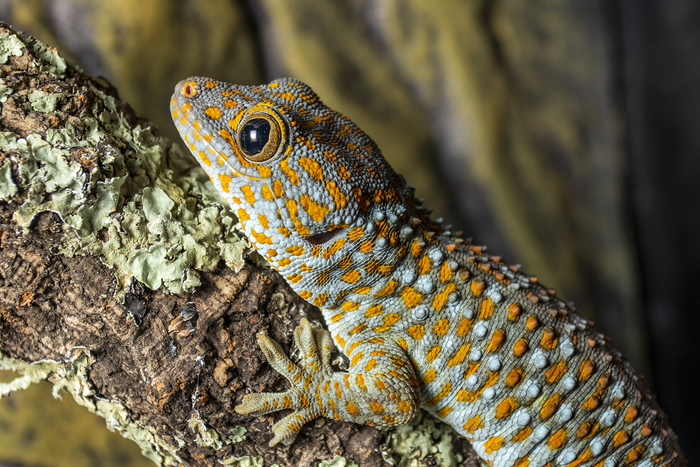Geckos can use their tongue to differentiate their own odor from that of other members of their species, as researchers from the University of Bern have shown in a new experimental study. The findings show that geckos are able to communicate socially, meaning that they are more intelligent than was previously assumed.

Credit: © Francesca Angiolani
Geckos can use their tongue to differentiate their own odor from that of other members of their species, as researchers from the University of Bern have shown in a new experimental study. The findings show that geckos are able to communicate socially, meaning that they are more intelligent than was previously assumed.
Self-recognition is the ability to detect stimuli which come from oneself. We as people, and also some animals, can identify ourselves visually when we look in the mirror. However, not all animals rely on their sense of sight, first and foremost. Geckos, and also other lizards and snakes, use their tongues to perceive chemicals, so-called pheromones, from other individuals. For instance, when climbing a wall, geckos pause every so often to dart their tongues around. This enables them to detect potential partners or rivals. But can geckos also detect their own odor and recognize themselves by smell?
In a study recently published in the journal Animal Cognition, researchers at the Institute of Ecology and Evolution of the University of Bern focused on whether Tokay geckos can detect skin chemicals that they themselves produce, and whether they can discriminate between these chemicals and those of other geckos of the same sex. The experiments confirmed that geckos are capable of this. During the tests, the animals were more interested in the skin chemicals of other geckos than in their own. This shows that geckos use pheromones for social communication.
Gecko and peppermint odor on cotton swabs
During the experiment, the researchers presented the geckos with various odors on cotton swabs. As well as their own odor, these were odors from other geckos, or control odors such as water and peppermint. When they reacted, the geckos showed two types of behavior: on one hand, they stuck out their tongues in the direction of the odor on the swab and, on the other hand, towards the surrounding area, their own home enclosure. The researchers interpreted this behavior as a sign that the geckos first perceive the odor on the swab, and then compare it with their own odor on the walls of the enclosure. “The geckos have to compare more frequently when confronted with the odor of another gecko, compared to their own odor. This indicates that they know their own odor,” explains Birgit Szabo, lead author of the study from the Division of Behavioural Ecology at the University of Bern’s Institute of Ecology and Evolution.
In an experiment, the team was also able to show that geckos detect and use the odors of their feces to distinguish themselves from others. Geckos also deposit pheromones on their excrement, for instance, to mark their territory. This is because, just like many mammals, geckos have preferred areas for defecation so that they can communicate their presence.
More social and intelligent than we thought
The findings of the study show that geckos can communicate socially by using chemicals from their skin and excrement, and that they use these chemicals to distinguish themselves from other geckos. “Lizards and reptiles are generally seen as unsocial primitive animals. We must recognize that reptiles are more social and intelligent than we thought,” says Birgit Szabo.
“Reptiles, and especially geckos, are ideally suitable for investigating fundamental questions about the evolution of sociality. Within geckos, we can find a vast range of social structures and habitats. This allows us to investigate the interrelationships of cognition, communication and social living within a small taxonomic group – and make comparisons between these and other, more distantly related groups of animals such as mammals and birds,” says Eva Ringler, professor and head of the Division of Behavioural Ecology at the University of Bern.
|
Publication details: Szabo, B., Ringler, E. Geckos differentiate self from other using both skin and faecal chemicals: evidence towards self-recognition? Anim Cogn (2023). https://link.springer.com/article/10.1007/s10071-023-01751-8 DOI: 10.1007/s10071-023-01751-8 |
|
Institute of Ecology and Evolution The Institute of Ecology & Evolution at the University of Bern is devoted to research and teaching in all aspects of ecology and evolution, and aims to provide a scientific basis for the understanding and preservation of our living world. It promotes the study of the mechanisms by which organisms respond to and interact with their environment, including phenotypic responses at individual level, change in gene frequencies at population level, change in species composition and abundance at community level, and the functioning of whole ecosystems. Read more |
Journal
Animal Cognition
DOI
10.1007/s10071-023-01751-8
Article Title
Geckos differentiate self from other using both skin and faecal chemicals: evidence towards self-recognition?
Article Publication Date
8-Feb-2023




